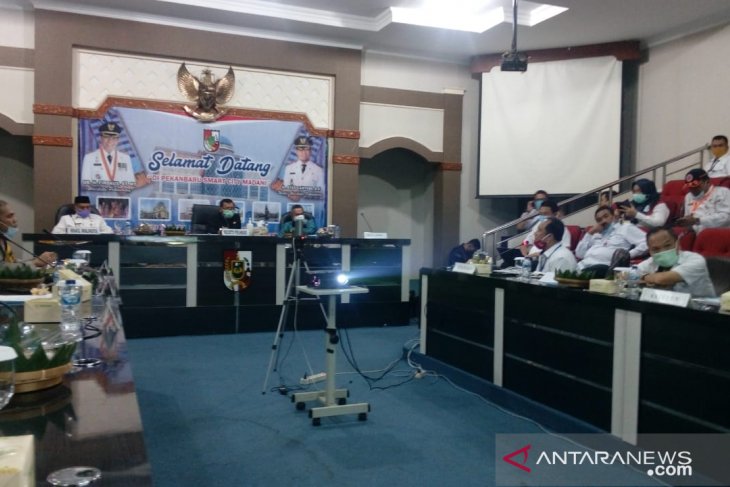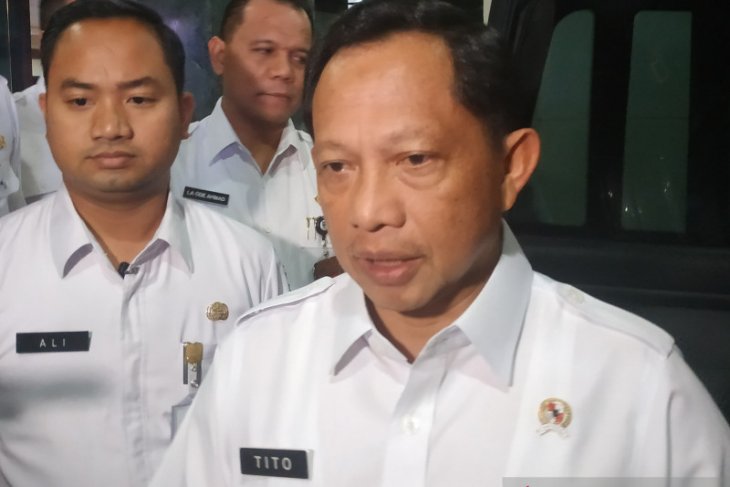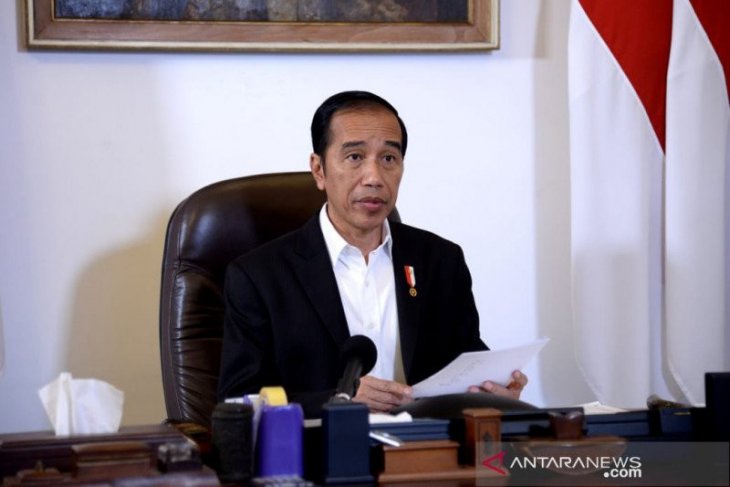Live Streaming
Program Highlight
Company Profile
June
Riau's Businessmen, Residents Warned for Flouting COVID-19 Protocols
Written by Ani Hasanah The Pekanbaru city government officials evaluated the third phase of enforcement of large-scale social restrictions on May 27, 2020 . (ANTARA/Vera Lusiana)
The Pekanbaru city government officials evaluated the third phase of enforcement of large-scale social restrictions on May 27, 2020 . (ANTARA/Vera Lusiana)
Some 40 businesspersons and residents in Pekanbaru, Riau Province’s capital, received warning letters from the city administration's public order agency (Satpol PP) for violating preventive measures necessitated under the government's COVID-19 protocols.
Hoteliers and owners of amusement centers were among the businesspersons found violating the COVID-19 protocols, Chief of the Pekanbaru City Public Order Agency Agus Pramono noted in a press statement received by ANTARA in Jakarta, Saturday.
The warning letters were sent since they failed to provide handwashing facilities to their customers. They also did not remind their visitors to practice physical distancing measures and wear face masks during the enforcement of the transitional period towards a "new normal".
"We monitor the business entities that have received our warning letters. If they overlook the warnings, their business permits will be revoked. The citizen identity number (NIK) of individuals found violating the COVID-19 protocols will be blocked," he cautioned.
Pramono called on Pekanbaru’s residents to adopt a disciplined approach in applying preventive measures mandated by the COVID-19 protocols to break the chain of the ongoing coronavirus pandemic.
As of June 26, Indonesia has had 51,427 confirmed COVID-19 cases since the government officially announced its first confirmed cases on March 2, according to the Indonesian Ministry of Health as reported by spokesman for COVID-19 handling Achmad Yurianto.
Of the total number of confirmed cases, 21,333 were discharged from hospitals, while 2,683 others succumbed to the deadly virus.
Coronavirus infections initially surfaced in the Chinese city of Wuhan at the end of 2019.
Since then, COVID-19 has spread to over 215 countries and territories, including 34 provinces of Indonesia, with a massive spurt in death toll.
The Indonesian government officially confirmed the country's first cases on March 2 this year. The COVID-19 pandemic is undeniably a huge crisis in human history that has caused a global economic crisis.
Indonesian President Joko Widodo (Jokowi) stated on Thursday that several nations were bearing the brunt of the ongoing global novel coronavirus disease (COVID-19) pandemic.
The International Monetary Fund has projected several countries to experience an economic contraction this year.
The US economy was forecast to contract up to minus eight percent, while those of Japan, the UK, France, Italy, Spain, and Germany would decline to -5.8 percent, -10.2 percent, -12.5 percent, -12.8 percent, - 12.8 percent, and -7.5 percent respectively. (ANTARA)
June
Jokowi Highlights Two Key Issues at Virtual 36th ASEAN Summit
Written by Ani HasanahDocumentation of President Joko Widodo (Jokowi). (ANTARA/HO-Presidential Press Office/Lukas/am/sw)
President Joko Widodo (Jokowi) drew attention to two key issues during the virtual 36th ASEAN Summit on Friday held to discuss economic revival in the post-pandemic era and regional cooperation.
"The president of the Republic of Indonesia, in his remark, brought up two main issues, with the first pertaining to the importance of the ASEAN to strengthen cooperation concerning the acceleration of ASEAN's economic recovery," Minister of Foreign Affairs Retno Marsudi stated at the Presidential Palace in Bogor after the high-level meeting.
Jokowi reiterated the declining economic growth owing to the COVID-19 outbreak while also delivering the latest IMF report on revising the world's economic growth to -4.9 percent, from -3 percent as announced earlier, Marsudi added.
With the pressing need for the ASEAN to work together, the head of state noted that connectivity on goods as well as service and economic agents shall soon be boosted.
"The ASEAN should begin preparations on the 'ASEAN travel corridor' thoroughly, measurably, and gradually, starting from 'the essential business travel corridor' that aligns with the stringent health protocols," Marsudi remarked.
Moreover, Jokowi spoke of boosting digital connectivity to broaden the implementation of e-commerce, e-heath and e-learning, including increasing access for the micro, small, and medium enterprises entering the digital platforms.
"Furthermore, President Jokowi highlighted that the signing of the RCEP (Regional Comprehensive Economic Partnership) this year will hold strategic significance for economic recovery as well as offer a momentum to reinforce economic resilience in the region after COVID-19," Marsudi elaborated.
Marsudi noted that the second aspect was regionalism as a form of deeper cooperation in the ASEAN.
The minister emphasized that the "ASEAN-led mechanism" aims to mobilize regional stability and peace during the new normal era. Concurrently, Indonesia's initiative of the ASEAN Outlook on the Indo-Pacific shall be strengthened on the basis of the inclusive, cooperation, rules-based order, and confidence-building principles. (ANTARA)
June
Minister Urges Regions to Socialize New Normal Implementation
Written by Ani Hasanah
Home Affairs Minister Tito Karnavian. (ANTARA/Boyke Ledy Watra/sh)
Indonesian Home Affairs Minister Tito Karnavian has asked regional governments to disseminate information about the implementation of the new normal to the public.
"We need to implement the new normal. I can understand the moves that have been taken by provinces, but the problem is how they are socializing them to the public," Karnavian said in a statement in Jakarta on Friday.
While scientists around the globe race to develop a COVID-19 vaccine, he said, life must go on and new norms should be imposed with stringent health protocols.
The minister admitted that socialization of the new normal would not be an easy task. He suggested local administrations take Bali as a model in the implementation of the new normal by involving customary figures.
"Take the example of Bali, where the pandemic is relatively under control, as they have a more homogenous social and cultural system. People have strong links with their local leaders, due to a vigorous system of customary villages and the remarkable role of the 'pecalang' (traditional Balinese security task force)," he elaborated.
In a homogenous society, according to Karnavian, the socialization and implementation of the new normal can be conducted in accordance with its local wisdom. But, in a heterogenous society, it should be accompanied by formal measures and involve heads of villages and neighborhoods.
In addition, the government would also need to involve the private sector and mobilize support from different elements of the society to support the adoption of the new norms.
"The involvement of the private sector is necessary in addition to the government's active role in applying health protocols in the new normal," he said.
The minister also asked local administrations to study the possibility of imposing legal as well as social sanctions against those found violating health protocols. (ANTARA)
June
AICHR Indonesia Encourages ASEAN to Form Refugee Protection Agency
Written by Ani Hasanah
Several Rohingya refugees rest in a hut of Lancok coastal traders in Syantalira Bayu District, North Aceh, Aceh, Thursday (25/6/2020). (Antara Foto / Rahmad/ak)
AICHR Indonesia encouraged the Association of Nations in Southeast Asia (ASEAN) to immediately establish a special refugee protection body, as several Southeast Asian nations are oftentimes the destinations of refugees, including Rohingyas, fleeing persecution in Myanmar.
Indonesian Representative to the ASEAN Intergovernmental Commission on Human Rights (AICHR), Yuyun Wahyuningrum make the remark through a written statement on Thursday (June 25), as received in Jakarta on Friday.
Wahyuningrum also called for the ASEAN to immediately outline protocols or ways that can be applied together to ensure the safety and security of refugees.
Wahyuningrum remarked that the Government of Indonesia could lead the discussion on establishing the protocol and protection body at the summit of ASEAN countries.
The 10 ASEAN countries held a virtual 36th high-level conference on June 26.
AICHR's terms of reference that prevents it from effectively protecting human rights and fundamental freedoms are one of the reasons behind several ASEAN countries refusing to extend assistance to Rohingya refugees adrift at sea.
Although other countries refused, the Government and people of Indonesia opted to help Rohingya refugees based on the fact that they had sailed through perilous seas in search of berths.
Recently, the residents of Lancuk, North Aceh, Aceh Province, rescued 94 Rohingya refugees, and they were evacuated to the mainland after being adrift in the waters near the coast since Wednesday (June 24).
Wahyuningrum pointed out that it was not the first time that such humanitarian action was taken by Aceh citizens, since in 2015, the local community had also received Rohingya refugees after they were not allowed to dock in Malaysia and Thailand.
"Once again, the people of Aceh are demonstrating humanity, leadership qualities, generosity, and solidarity to those compelled to flee their homes to avoid persecution," Wahyuningrum remarked.
Furthermore, she welcomed the statement of the Indonesian Government's commitment to protect refugees.
"I laud the statement of the Indonesian minister of foreign affairs (Retno Marsudi) who said that Indonesia remains committed to providing assistance and taking various steps to prevent Rohingya refugees from undertaking dangerous trips in the ocean," Wahyuningrum stated.
On the occasion, Wahyuningrum reminded the Indonesian government to meet the basic requirements of refugees, including shelter with sanitation, food, and security and safety guarantees. Furthermore, the Government of Indonesia should ensure that refugees adhere to health protocols to prevent the transmission of COVID-19.
"Although Indonesia is not yet a member of the 1951 Refugee Convention, it has ratified the Covenant on Civil and Political Rights, which in Article 13 explicitly prohibits the expulsion of collective exclusion. Not only that, the rights for asylum seekers is also protected in the ASEAN Declaration of Human Rights," Wahyuningrum emphasized. (ANTARA)



